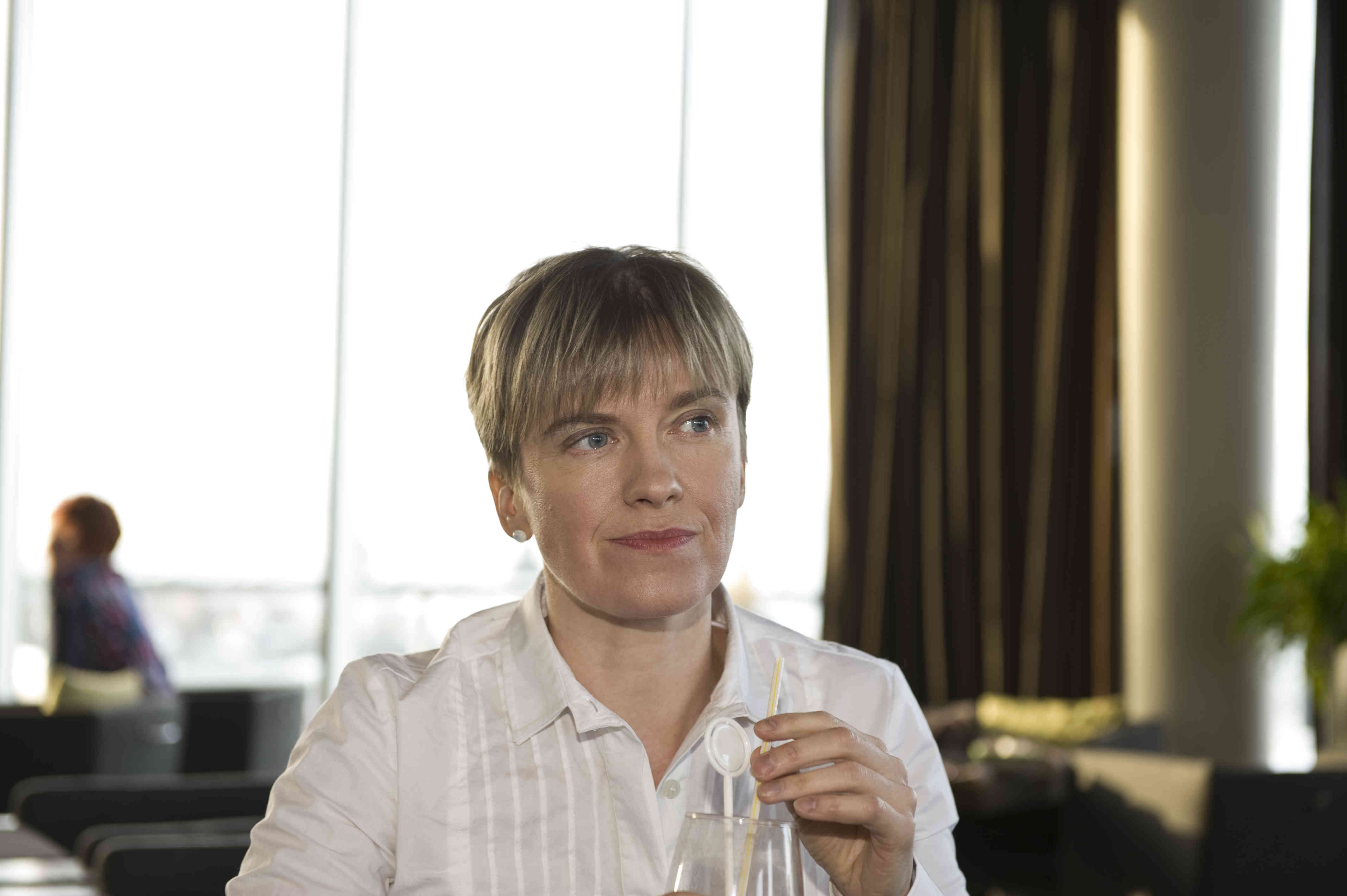
Maarja Kangro
Poems 
Short stories
Non-fiction
About Maarja Kangro
Maarja Kangro (b. 20 December 1973) is a translator, poet, prose writer and essayist.
She was born in Tallinn, studied English language and literature at the University of Tartu and defended her MA degree there. From 2007 she is a doctoral student of cultural studies at Tallinn University. She is a member of the Estonian Writers’ Union since 2007 (chairman since 2024).
One of the most outstanding and intriguing authors in present-day Estonian literature started her literary career as a translator; her debut in belles-lettres was the poetry collection Kurat õrnal lumel (‘Devil on Tender Snow’) in 2006. For three times, Kangro’s poetry collections have received the Tallinn University Literary Award: in 2008 for Tule mu koopasse, mateeria (‘Come into My Cave, Matter’, 2007), in 2009 for Heureka (‘Eureka’, 2008) and in 2020 for Tuul (‘Wind’, 2019). Heureka also received the Literature Endowment Annual Award. Kangro stands out for her intellectual and intertextual poetry which has ripened with time and become sharper and more succinct. Kangro’s characteristics are irony, unexpected turns and/or points of view, social sensitivity, different layers of meaning, familiarity with the European cultural space and personal encounters (or collisions) with social problems.
Kangro’s prose which provides insights into the present-day cosmopolitan world where human relations and society are equally treated without sentiment has attracted as much attention as her poetry. The central place belongs to modern educated and self-aware female characters whose language usage does not differ from the stereotypically male mode of expression, and who often encounter questions related to intellectual versus biological self-actualisation. This theme is discussed for example in 48 tundi (‘48 hours’) which won the Friedebert Tuglas Short Story Prize in 2011. It describes a woman’s attempt to become pregnant and was published in the collection Ahvid ja solidaarsus (‘Monkeys and Solidarity’) which received the Literature Endowment Annual Award. For the second time, she earned the Friedebert Tuglas Short Story Prize in 2014 for Atropose Opel Meriva (‘Atropos’ Opel Meriva’) which was published in the collection Hüppa tulle (‘Jump into the Fire’, 2014).
Her first longer prose work Klaaslaps (‘Glass Child’, 2016) was also met with great reception. It describes the attempts of a woman approaching the middle age to get pregnant and the short-lived happiness of expecting a baby, but the foetus does not prove viable. The autobiographical documentary novel which destroys the borders between fiction and real life and between genres observes the story of an unborn child with rough honesty and in great detail. Traumatic emotional experiences are intertwined with broader social events which are described with her idiosyncratic humour that this time is blacker than black.
(Self)ironical, critical and witty Minu auhinnad (‘My Awards’, 2018) takes a glance at the backstage of Estonian literary awards from the viewpoint of both the receiver and the giver of the awards and provides a broader analysis of the award culture.
In 2003 she received the first prize at the poetry translation contest of the Dante Alighieri Society, in 2006 the Raisin of the Year Award for the best children’s book Puuviljadraakon (‘The Fruit Dragon’, 2006), in 2016 the Tallinn University Literary Award for the translation of Hans Magnus Enzensberger’s Der Untergang der Titanic (‘Titanicu põhjaminek’) and in the same year the Erster Rödermarksche Literaturpreis for her poem Vana armuke (Der Ex, in Cornelius Hasselblatt’s translation). In 2011 she received the Estonian Cultural Endowment scholarship Ela ja sära (‘Live and Shine’) and in 2016–2018 the writer’s salary from the Estonian Ministry of Culture.
A. K. (Translated by I. A.)
Books in Estonian
Novels
Klaaslaps. Tallinn: Nähtamatu Ahv, 2016, 208 lk.
Short stories
Ahvid ja solidaarsus. Tallinn: Eesti Keele Sihtasutus, 2010, 191 lk.
Dantelik auk. Tallinn: Eesti Keele Sihtasutus, 2012, 140 lk.
Hüppa tulle. Tallinn: Nähtamatu Ahv, 2014, 163 lk.
Poetry
Kurat õrnal lumel. Tallinn: Verb, 2006, 88 lk.
Tule mu koopasse, mateeria. Tallinn: Eesti Keele Sihtasutus, 2007, 92 lk.
Heureka. Tallinn: Eesti Keele Sihtasutus, 2008, 74 lk.
Kunstiteadlase jõulupuu. Tallinn: Eesti Keele Sihtasutus, 2010, 76 lk.
Must tomat. Tallinn: Eesti Keele Sihtasutus, 2013, 73 lk.
Tuul. Tallinn: Nähtamatu Ahv, 2019, 118 lk.
Children’s literature
Puuviljadraakon. Tallinn: Koolibri, 2006, 32 lk.
Isa kõrvad: lugusid lastele. Tallinn: Nähtamatu Ahv, 2020, 78 lk.
Varia
Minu auhinnad. Tallinn: Nähtamatu Ahv, 2018, 333 lk.
Kaks pead: libretoraamat. Tallinn: Nähtamatu Ahv, 2020, 152 lk.


